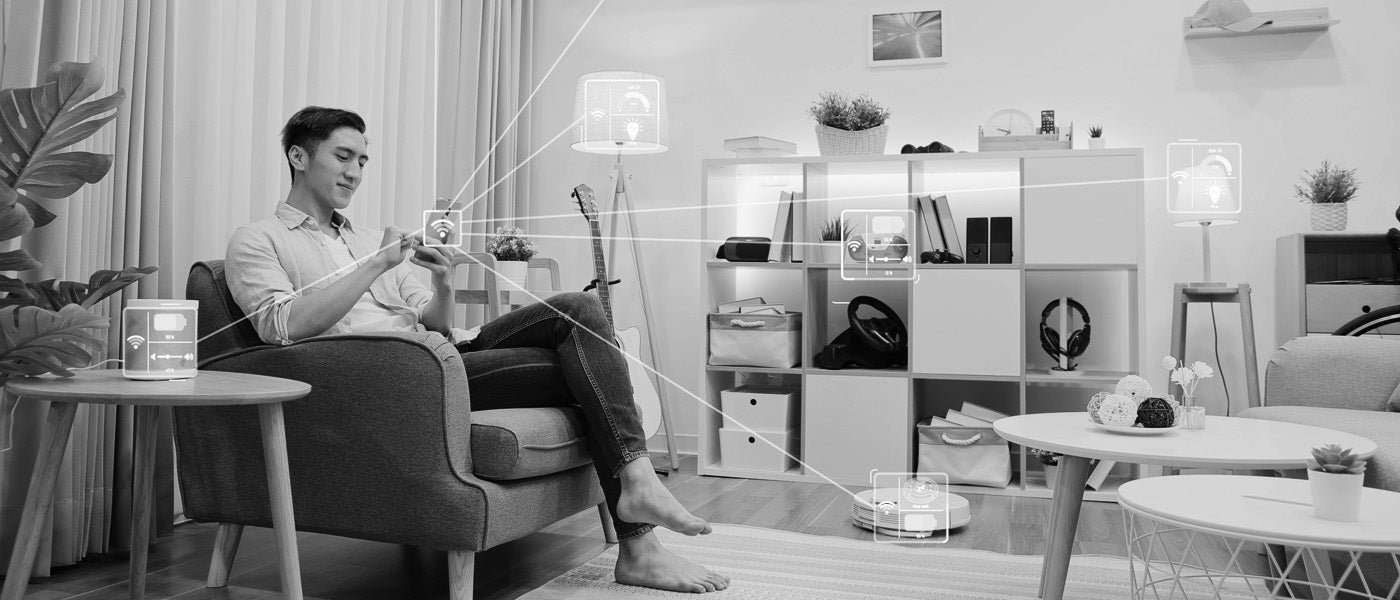In today's fast-paced world, home security has become more important than ever. Whether you want to keep an eye on your car in the driveway, check on your parcel deliveries or have a holiday home, there is a home security option for you. The rise of smart home technology and innovative gadgets has changed how we safeguard our homes, offering convenience, efficiency, and peace of mind. In this blog, we'll delve into the world of home security, exploring the benefits of smart technology and the role gadgets can play in keeping our homes safe.
Security Cameras
High-definition surveillance cameras provide round-the-clock home security. These cameras can offer live streaming, motion detection, and cloud storage capabilities. Many have an app you can download to your smartphone so you can keep an eye on their property from anywhere in the world. This makes them perfect for when you are away on holiday. The camera just needs a wi-fi connection so the data can be uploaded to your storage option. Additionally, many models feature advanced AI algorithms that can distinguish between humans, animals, and vehicles, reducing false alarms.
Video Doorbells
The video doorbell is probably one of the most popular smart home security device in recent years. They are affordable and a great way to enhance your home security. Video doorbells combine the functionality of a doorbell with a built-in camera and intercom system. When someone rings the doorbell, you will receive an instant notification to your smartphone. You can see, hear, and speak to visitors in real-time. This acts as a deterrent for potential intruders and also allows for seamless communication with unexpected guests or delivery people.
Additionally, video doorbells often feature motion detection , alerting you whenever someone approaches your door, even if they don't ring the bell. This proactive feature can help deter potential intruders by giving you early notice of unusual activity. Many models also have night vision capabilities, ensuring your home is protected around the clock.
Many video doorbells are designed for easy DIY installation and come with step-by-step instructions and mounting hardware. Installation typically involves connecting the doorbell to existing wiring or attaching it to the door frame using screws. However, some models may require professional installation, especially if wiring is not already in place.
Wi-Fi Extenders
Wi-Fi extenders offer more than just extended coverage; they also enhance the overall performance of your home security system by providing reliable connectivity in areas where your main router’s signal may falter. For instance, remote locations like garages, basements, or external sheds can house smart locks, motion detectors, and outdoor cameras that need a stable connection to function properly. Without a reliable Wi-Fi signal, these devices might experience downtime, leaving parts of your home vulnerable.
Additionally, Wi-Fi extenders support bandwidth-intensive features , such as high-resolution video recording from security cameras. Cameras that record in 1080p or higher demand substantial bandwidth to transmit live footage or store recordings in the cloud. Wi-Fi extenders help ensure that these devices function smoothly even during high-traffic periods, like when multiple family members are using the internet simultaneously for streaming or gaming. This prevents network slowdowns, keeping your security system responsive.
By maintaining consistent connectivity, extenders also help reduce latency in two-way communication with devices such as video doorbells. Quick interaction is crucial, especially when you need to talk to someone at your door or monitor real-time events. Moreover, extenders are essential for ensuring smart home automation systems (e.g., turning off alarms or locking doors remotely) remain responsive without delays, no matter where you are in the house.
Another benefit is that Wi-Fi extenders can often be integrated with mesh networks , which provide an even more seamless connection across large properties. Mesh networks allow for smarter, dynamic routing of your Wi-Fi signal, automatically directing bandwidth where it’s needed most, including to your security devices. With a mesh system supported by Wi-Fi extenders, your home security devices are less likely to experience connection drops or delays.
Finally, in the case of a power outage , many modern Wi-Fi extenders have built-in fail-safe measures, allowing them to quickly resume operation once power is restored, minimizing downtime for your security devices.
Home Security faqs
Are smart home security systems easy to install?
Many smart home security devices are designed for easy installation and setup, often requiring no professional assistance. Most devices come with step-by-step instructions and can be installed using simple tools. However, some systems may require more advanced setup or integration with existing infrastructure, in which case professional installation may be recommended.
Are smart home security systems secure?
Smart home security systems employ various security measures to protect against unauthorised access and data breaches. These measures may include encryption protocols, secure authentication methods, and regular software updates. You can enhance security by using strong, unique passwords and keeping your devices and software up to date. You can also add 2FA to access your storage apps on your smartphone for extra peace of mind.
Do smart home security systems require a monthly subscription?
Some smart home security systems may offer optional subscription plans that provide additional features or services, such as cloud storage for video footage or professional monitoring. However, many devices can function without a subscription, allowing homeowners to use basic features at no additional cost. It's important to review the features and pricing of subscription plans before deciding.
Do smart home security systems comply with privacy regulations?
Smart home security systems are subject to privacy regulations and guidelines that govern the collection, storage, and use of personal data. Manufacturers should provide transparency about their data practices and obtain user consent before collecting or sharing personal information. You should review the company's privacy policies and settings to understand how your data is being handled and take steps to protect your privacy.
Do video doorbells record all the time?
Most video doorbells only record video footage when triggered by motion or when the doorbell button is pressed. Some models offer continuous recording options with a subscription plan, but this may require additional storage and bandwidth.










